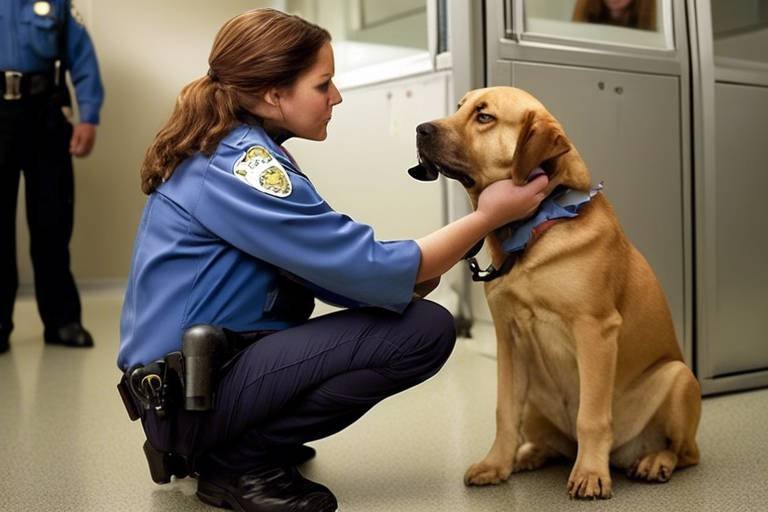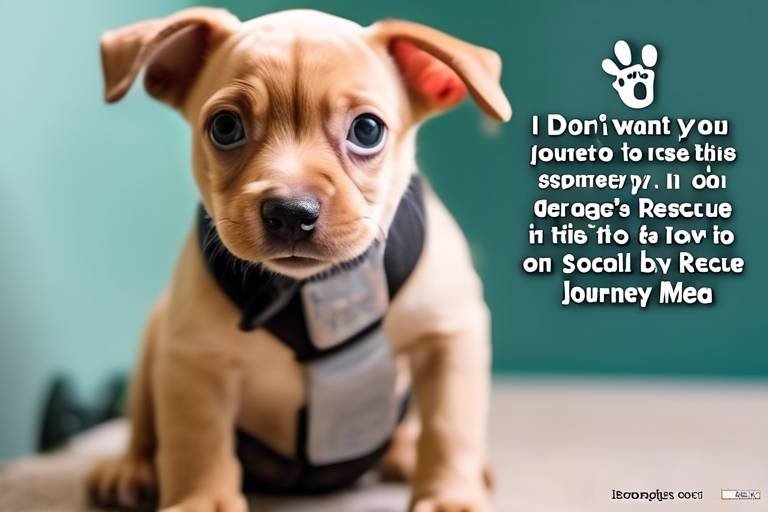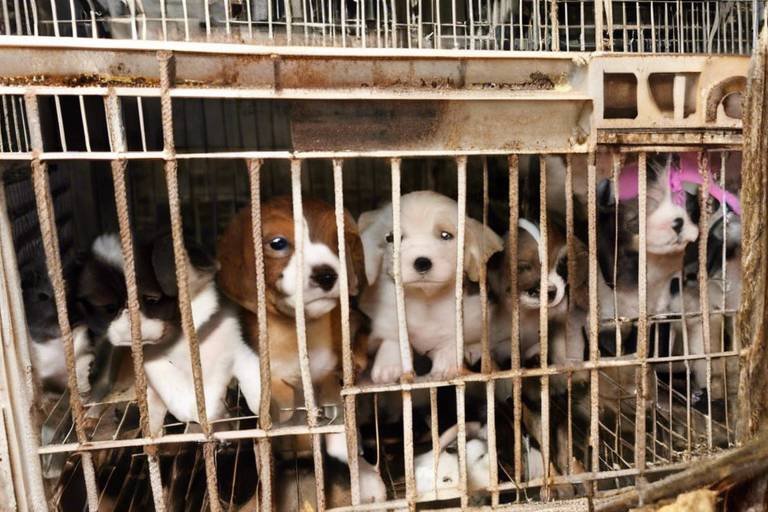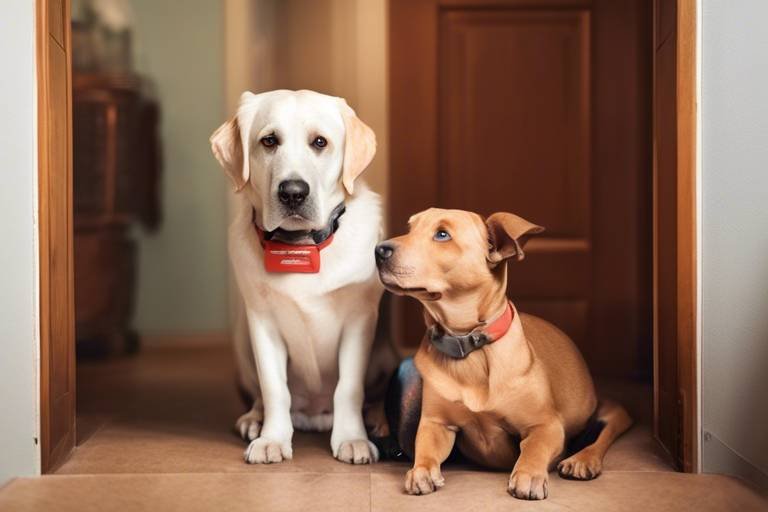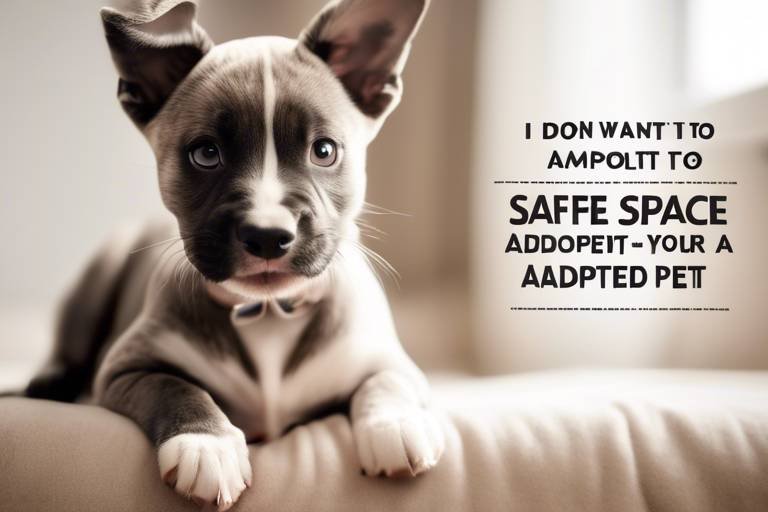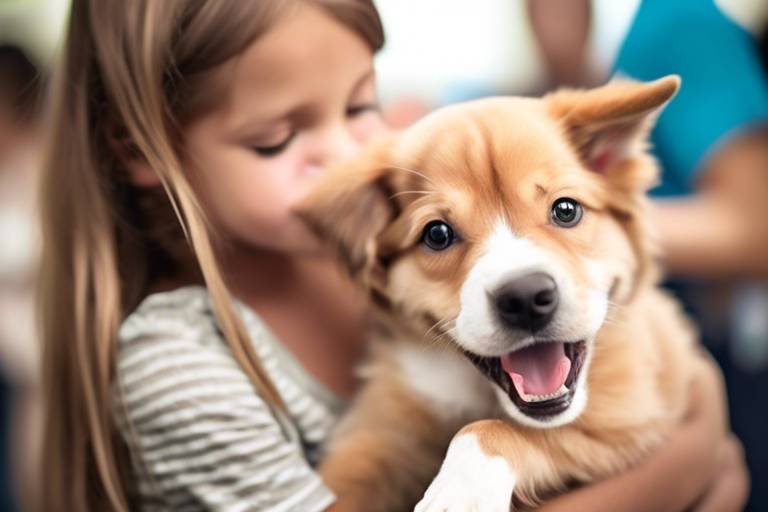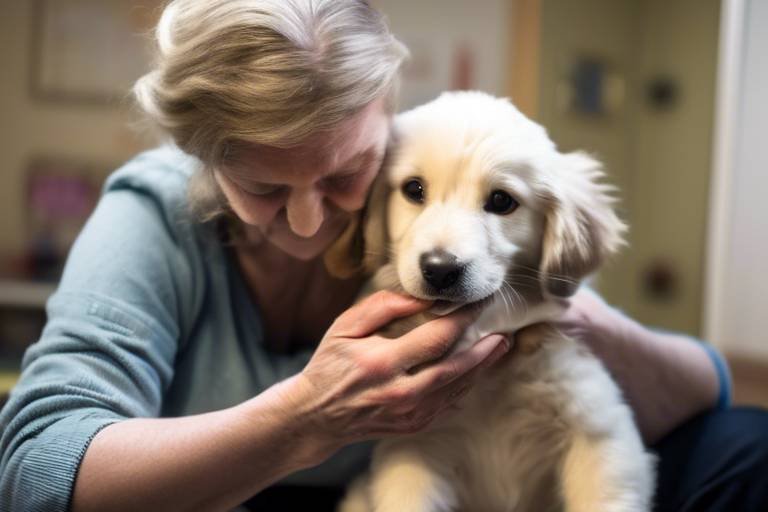The Role of Animal Control in Pet Adoption
When we think about bringing a furry friend into our lives, many of us might imagine cuddling with a puppy or playing fetch with a kitten. But have you ever considered the journey these animals take before they find their forever homes? Animal control agencies are the unsung heroes in this process, working tirelessly behind the scenes to ensure that pets are not only adopted but are also placed in loving and responsible homes. Their role is vital in promoting animal welfare, ensuring public safety, and fostering a culture of responsible pet ownership within our communities.
Animal control isn’t just about managing stray animals; it’s about creating a safe environment for both pets and people. These agencies are often the first point of contact for abandoned or neglected animals, providing them with shelter, medical care, and a second chance at life. They work diligently to reunite lost pets with their owners and to educate the public on the importance of spaying and neutering, which helps control the pet population and reduces the number of animals in shelters.
Imagine walking into a shelter where every animal is given the chance to thrive. This is the vision that animal control agencies strive for. They implement programs that facilitate pet adoption, ensuring that each animal is matched with the right family. This process is not just about finding a home; it’s about finding the right home. By assessing the needs of both the pets and the potential adopters, these agencies create a harmonious match that benefits everyone involved.
In addition to matching pets with families, animal control agencies also prioritize education. They provide resources and support to help new pet owners understand their responsibilities. This includes information on proper care, training techniques, and even behavioral issues that may arise. By equipping adopters with knowledge, animal control agencies help ensure that pets remain in their homes and do not end up back in shelters.
Ultimately, the role of animal control in pet adoption is multifaceted. They are advocates for animals, educators for the public, and facilitators of love and companionship. Without their dedication and hard work, many animals would struggle to find homes, and many families would miss out on the joy that a pet can bring. So, the next time you consider adopting a pet, remember the vital role that animal control plays in making that possible. They are not just organizations; they are lifelines for animals in need and champions for responsible pet ownership.
- What is the main purpose of animal control agencies?
Animal control agencies aim to manage stray and abandoned animals, enforce animal laws, and promote public safety while ensuring the well-being of the animals in their care. - How can I adopt a pet from an animal control agency?
The adoption process typically involves filling out an application, undergoing an evaluation, and sometimes a home visit to ensure a good match between the pet and the adopter. - Are there costs associated with pet adoption?
Yes, adoption fees help cover the costs of vaccinations, spaying/neutering, and general care, allowing agencies to continue their services and support more animals in need. - What kind of support do animal control agencies provide after adoption?
Many agencies offer post-adoption support, including resources on training, health care, and behavioral issues to help new pet owners adjust.

Understanding Animal Control
This article explores the vital functions of animal control agencies in facilitating pet adoption, ensuring animal welfare, and fostering responsible pet ownership within communities.
Animal control agencies are the unsung heroes in our communities, working tirelessly behind the scenes to manage stray and abandoned animals. They serve as the bridge between vulnerable animals and loving homes, ensuring that every furry friend has a fighting chance at a happy life. Imagine walking down the street and seeing a lost dog or a cat in distress; it’s these dedicated teams that swoop in to help. Their responsibilities extend beyond simply rescuing animals; they also enforce animal laws and promote public safety, all while prioritizing the well-being of the creatures in their care.
These agencies are crucial in addressing the challenges posed by overpopulation, neglect, and abuse. They often collaborate with local shelters and rescue organizations to create a network of support for animals in need. The work they do is not just about removing animals from dangerous situations; it’s about creating a community where animals are valued and treated with respect. They educate the public on responsible pet ownership, which is essential in reducing the number of animals that end up in shelters.
One of the key functions of animal control is to manage stray populations. This involves:
- Rescuing lost or abandoned pets
- Providing shelter and care for these animals
- Conducting outreach to reunite lost pets with their owners
Through these efforts, animal control agencies not only help animals but also contribute to the overall safety and health of the community. They address issues such as stray dog packs that could pose risks to public safety and work to mitigate the spread of zoonotic diseases.
Furthermore, animal control plays a crucial role in enforcing laws related to animal welfare. This includes ensuring that pet owners comply with local regulations regarding vaccinations, licensing, and spaying/neutering. By holding pet owners accountable, these agencies help create a culture of responsibility that benefits both animals and people.
In summary, animal control agencies are vital to the fabric of our communities. They not only manage stray and abandoned animals but also work to foster a culture of responsible pet ownership. Their efforts ensure that animals receive the care they need while also protecting public safety. Without these dedicated professionals, many animals would face uncertain futures, and the bond between humans and pets would be significantly weakened.
The pet adoption process involves several steps, including application, evaluation, and home visits, ensuring that pets are placed in suitable and loving homes to enhance their chances of a happy life.
Potential adopters must meet specific criteria, including age, residency, and financial stability, to ensure they can provide a stable and nurturing environment for their new pet.
Home visits are conducted to assess the living conditions and ensure they are safe and suitable for the pet, promoting responsible pet ownership and reducing the likelihood of returns.
Adoption fees help cover the costs of vaccinations, spaying/neutering, and general care, making it more feasible for animal control agencies to continue their services and support more animals in need.
Animal control agencies often provide post-adoption support, including resources on training, health care, and behavioral issues, to help new pet owners adjust and ensure a successful transition.
Community outreach initiatives aim to educate the public about responsible pet ownership, the importance of spaying/neutering, and the benefits of adopting from local shelters rather than purchasing from breeders.
Workshops and seminars provide valuable information on various topics, such as pet care, training techniques, and the responsibilities of pet ownership, empowering potential adopters to make informed decisions.
Collaborations with local businesses and non-profits enhance outreach efforts, enabling animal control agencies to reach a broader audience and promote the importance of adopting pets in need.
Q: What should I do if I find a stray animal?
A: Contact your local animal control agency for assistance. They can provide guidance on how to safely capture the animal and find it a home.
Q: How can I adopt a pet from an animal control agency?
A: Visit your local agency’s website for information on the adoption process, including application requirements and fees.
Q: What are the benefits of adopting over buying a pet?
A: Adopting a pet saves a life, supports your community, and often comes with health benefits, as many adopted pets are already vaccinated and spayed/neutered.

The Adoption Process
The pet adoption process is more than just picking out a cute face; it's a journey that ensures both the animal and the adopter are ready for a lifelong commitment. When you decide to adopt, you're stepping into a world filled with responsibilities, joys, and the occasional challenge. First things first, potential adopters need to fill out an application. This isn't just a formality; it's a crucial step that helps animal control agencies understand who you are and what kind of environment you can provide. The application typically asks for basic information such as your name, address, and contact details, but it goes deeper than that. You'll be asked about your lifestyle, previous pet ownership experiences, and your understanding of the responsibilities involved in caring for a pet.
Once your application is submitted, the next step is the evaluation. This part involves a thorough review of your application to ensure you're a good fit for the pet you wish to adopt. Animal control agencies want to make sure that the animal's needs align with your lifestyle. For instance, if you're a busy professional who travels often, adopting a high-energy dog might not be the best choice. Instead, a more independent cat could be a better match. This evaluation process is designed to foster successful adoptions, which ultimately leads to happier pets and owners.
After the evaluation, many agencies conduct home visits. This step is essential because it allows the agency to assess your living conditions. They want to ensure that the environment is safe and suitable for the pet. Imagine bringing home a puppy only to realize your apartment has no yard for it to play in! Home visits are not meant to invade your privacy; rather, they are a friendly check to make sure everything is in order. The agency might look for things like secure fencing, available space for the pet to roam, and even the presence of any hazards that could endanger the animal.
Now, let’s talk about adoption fees. You might be wondering why there’s a cost associated with adopting a pet. These fees are not just a money grab; they serve a vital purpose. Adoption fees help cover essential services like vaccinations, spaying or neutering, and general medical care. By charging these fees, animal control agencies can continue their important work and support more animals in need. Think of it as an investment in the health and well-being of your new furry friend. Plus, many agencies offer discounts or sliding scale fees based on financial need, making it more accessible for everyone.
Once you’ve successfully navigated the application, evaluation, and home visit, and paid the adoption fee, congratulations! You’re ready to welcome your new pet into your home. But the journey doesn’t end there. Animal control agencies often provide post-adoption support. This support can include resources on training, health care, and behavioral issues. After all, adopting a pet is just the beginning of a lifelong adventure. New pet owners might face challenges like house training or dealing with separation anxiety, and having access to resources can make all the difference in ensuring a smooth transition.
In summary, the adoption process is designed to ensure that pets are placed in loving, responsible homes. It’s a thoughtful journey that requires commitment and understanding from both the adopter and the agency. So, if you're considering adopting a pet, remember that this process is not just about finding a companion; it's about making a commitment to care for a living being that will rely on you for its happiness and well-being.
- What should I bring to the adoption appointment? It's important to bring identification, proof of residence, and any necessary documentation that shows your ability to care for a pet.
- Can I adopt a pet if I have other animals at home? Yes, many agencies allow you to adopt if you have other pets, but they may require a meet-and-greet to ensure compatibility.
- What if I need to return the pet? While we hope that doesn't happen, most agencies have a return policy to ensure the pet can find a suitable home.
Application Requirements
When it comes to adopting a pet, the are not just a bureaucratic hurdle; they are a crucial step in ensuring that every animal finds a loving and suitable home. Animal control agencies have established specific criteria that potential adopters must meet, and these criteria serve a dual purpose: they protect the welfare of the animals and help ensure that new pet owners are prepared for the responsibilities that come with pet ownership.
First and foremost, age is a significant factor. Most agencies require that adopters be at least 18 years old. This age requirement is in place to ensure that individuals can legally enter into contracts and are generally more capable of understanding the long-term commitment of pet ownership. After all, adopting a pet is not just about bringing a cute face into your home; it’s about providing a stable environment for that animal for its entire life, which can often span 10 to 15 years or more!
Residency is another critical requirement. Many animal control agencies stipulate that potential adopters must be residents of the area they serve. This is important not just for local regulations but also for the community aspect of pet ownership. When you adopt a pet, you’re not just bringing an animal into your home; you’re also becoming part of a larger community of pet owners. Being a local resident means you can easily access community resources, including veterinary services, training classes, and social events that can help you and your new pet thrive.
Financial stability is also a crucial consideration in the adoption process. Agencies want to ensure that adopters can provide for their pet’s needs, including food, veterinary care, and other essentials. While many people may think they can afford a pet, it’s essential to look at the long-term financial commitment involved. To help potential adopters understand these costs, some agencies even provide a
| Expense Type | Estimated Monthly Cost |
|---|---|
| Food | $30 - $60 |
| Veterinary Care (Routine) | $20 - $50 |
| Grooming | $10 - $30 |
| Training Classes | $15 - $50 |
| Miscellaneous Supplies | $10 - $25 |
In addition to these basic requirements, some agencies may also ask for references or conduct background checks to ensure that potential adopters have a history of responsible pet ownership. This can include checking if the applicant has previously owned pets and how they were cared for. It's a way to gauge whether a person is likely to follow through on their commitment to their new furry friend.
Ultimately, these application requirements are designed to create a win-win situation. By ensuring that pets are placed in homes where they will be loved and cared for, animal control agencies can reduce the likelihood of animals being returned to shelters, which can be traumatic for them. So, if you’re considering adopting, take these requirements seriously—they’re there to help you become the best pet parent you can be!
Home Visits
When it comes to pet adoption, home visits are a crucial step that cannot be overlooked. They serve as a bridge between the animal control agency and potential adopters, ensuring that the environment where the pet will live is safe, comfortable, and conducive to a happy life. Think of it as a first date; just as you would want to impress someone with your living space, the agency wants to ensure that the home is a suitable match for the pet’s needs. During these visits, trained professionals assess various aspects of the household, including the living space, yard (if applicable), and the overall readiness of the family to welcome a new furry member.
Typically, the home visit will involve a friendly conversation with the potential adopters. The agency representative will ask questions about the family's lifestyle, daily routines, and how they plan to integrate the new pet into their lives. This dialogue is essential, as it not only helps the agency gauge the suitability of the home but also provides an opportunity to educate the adopters on responsible pet ownership. For instance, they might discuss:
- The importance of creating a safe space for the pet.
- How to introduce the pet to other family members, including any existing pets.
- Basic training tips to ensure a smooth transition.
Moreover, the agency will evaluate the physical environment. Are there any hazards that could pose a risk to the pet? Is there enough space for the pet to roam and play? These considerations are vital because they directly impact the animal's well-being. If the home has a yard, the agency will check for secure fencing and any potential escape routes. If it’s an apartment, they will assess the availability of nearby parks or open spaces for exercise. It’s about ensuring that the pet will have a fulfilling life, not just a roof over its head.
In some cases, the agency may also provide suggestions on how to improve the living conditions for the pet. This could include recommendations for pet-proofing the home, creating a designated pet area, or tips on how to manage pet-related expenses. The goal is to foster a sense of responsibility and commitment in the adopters, ensuring that they are fully prepared for the joys and challenges of pet ownership.
Ultimately, home visits are not just a formality; they are a vital part of the adoption process. They help animal control agencies ensure that pets are placed in loving, responsible homes while also empowering new owners with the knowledge and tools they need to succeed. By taking this extra step, agencies can significantly reduce the likelihood of pets being returned, creating a win-win situation for both the animals and their new families.
Q: What happens if my home doesn't meet the requirements during a home visit?
A: If your home doesn't meet the necessary requirements, the agency will provide feedback and suggestions on how to improve the environment. They may allow you to reapply after making adjustments.
Q: How long does a home visit typically take?
A: Home visits usually last between 30 minutes to an hour, depending on the complexity of your living situation and the number of questions asked.
Q: Can I ask questions during the home visit?
A: Absolutely! Home visits are a two-way conversation, and you should feel free to ask any questions you have about pet care, training, or the adoption process.
Q: Will the agency inform me of their decision immediately after the home visit?
A: While some agencies may provide immediate feedback, others might take a few days to process the information and make a final decision.
Adoption Fees
When considering pet adoption, many potential pet owners often wonder about the involved. These fees are not just arbitrary numbers; they serve a significant purpose in the overall health and well-being of the animals. Typically, adoption fees can vary widely depending on the animal control agency and the type of animal being adopted. For example, adopting a dog may cost more than adopting a cat due to factors like size, breed, and demand. On average, adoption fees can range from $50 to $300, but this fee often encompasses much more than just the act of bringing a new pet home.
Adoption fees help cover various essential services that the animals have received prior to adoption. These services include:
- Vaccinations: Most pets are vaccinated against common diseases, ensuring they are healthy when they enter your home.
- Spaying/Neutering: This crucial procedure not only helps control the pet population but also contributes to the pet's overall health.
- Microchipping: Many agencies will microchip pets to help reunite them with their owners if they ever get lost.
- Health Check-ups: Animals are often examined by veterinarians to ensure they are free from serious health issues.
By paying these adoption fees, you are not just acquiring a pet; you are also contributing to the ongoing efforts of animal control agencies to rescue and rehabilitate more animals in need. Think of it as an investment in your new furry friend’s future. The fees collected help sustain these organizations, allowing them to continue their vital work in the community.
Moreover, understanding the breakdown of these fees can help potential adopters appreciate where their money is going. Here’s a simple table illustrating typical adoption fee allocations:
| Service | Estimated Cost |
|---|---|
| Vaccinations | $50 - $100 |
| Spaying/Neutering | $75 - $150 |
| Microchipping | $25 - $50 |
| Health Check-up | $50 - $100 |
In conclusion, while the adoption fee might initially seem like a hurdle, it is, in fact, a small price to pay for the love and companionship of a pet. It ensures that you are bringing home a healthy, well-cared-for animal, and it supports the ongoing mission of animal control agencies. So, the next time you consider adopting, remember that your fee is not just a transaction; it’s a contribution to a greater cause.
- What does the adoption fee cover? Adoption fees typically cover vaccinations, spaying/neutering, health check-ups, and sometimes microchipping.
- Are adoption fees refundable? Generally, adoption fees are not refundable, but some agencies may have policies in place for specific situations.
- Can I negotiate the adoption fee? While some agencies may offer discounts or waived fees during special events, it’s best to inquire directly with the agency.
Post-Adoption Support
Adopting a pet is a life-changing decision, not just for the furry friend you bring home but for you as well. Animal control agencies understand that the journey doesn't end once the adoption papers are signed. In fact, it's just the beginning! To ensure a smooth transition for both pets and their new families, many agencies offer services that are invaluable for new pet owners. This support is designed to help you navigate the first few weeks and months with your new companion, addressing any concerns and ensuring that both you and your pet thrive.
One of the primary components of post-adoption support is access to resources on training and behavior. Puppies and kittens are adorable, but they also come with a learning curve. Animal control agencies often provide guides, workshops, and even one-on-one training sessions to help you teach your pet basic commands, proper socialization, and good manners. Imagine having a well-behaved dog that greets guests without jumping all over them or a cat that uses the litter box without fail! With the right training, these scenarios can be your reality.
Additionally, many agencies offer health care resources to ensure your new pet remains healthy and happy. This can include information on vaccinations, regular check-ups, and tips for maintaining a balanced diet. Some agencies have partnerships with local veterinarians who may offer discounted services for newly adopted pets. This not only helps you save money but also ensures your pet receives the best care possible. After all, a healthy pet is a happy pet!
But what happens if you encounter behavioral issues? Don’t worry! Animal control agencies are equipped to assist with common challenges such as separation anxiety, excessive barking, or litter box issues. They often have behavioral specialists who can provide advice tailored to your specific situation. This support is crucial because it helps prevent the heart-wrenching situation where a pet is returned to the shelter due to avoidable problems. Remember, every pet has its quirks, and with some patience and guidance, many of these issues can be resolved.
Furthermore, post-adoption support extends beyond just training and health care. Many agencies create a sense of community among pet owners through social events and meet-ups. These gatherings allow you to connect with other pet owners, share experiences, and even allow your pets to socialize with others. Imagine a sunny afternoon at the park, surrounded by fellow pet lovers, sharing tips while your dog plays with new furry friends. It’s a win-win situation!
In summary, the post-adoption support provided by animal control agencies is a vital resource that enhances the likelihood of a successful pet adoption. By offering training resources, health care information, behavioral support, and community engagement, these agencies ensure that both pets and their new owners embark on a rewarding journey together. So, as you celebrate your new furry family member, remember that you’re not alone; help is just a phone call away!
Here are some common questions that many new pet owners have regarding post-adoption support:
- What kind of training resources are available? Many agencies provide training manuals, workshops, and sometimes even access to professional trainers.
- Are there any health care resources offered? Yes, many agencies partner with local veterinarians to offer discounted services for newly adopted pets.
- What should I do if my pet exhibits behavioral issues? Reach out to your agency’s behavioral specialists for tailored advice and strategies.
- Can I meet other pet owners? Absolutely! Many agencies host social events and meet-ups to help you connect with fellow pet lovers.

Community Outreach Programs
Community outreach programs are essential for bridging the gap between animal control agencies and the public. These initiatives not only educate the community about responsible pet ownership but also highlight the importance of adopting pets from shelters rather than purchasing from breeders. Imagine a community where everyone understands the value of giving a homeless animal a second chance; that’s the dream these programs strive to achieve. By fostering a culture of compassion and responsibility, animal control agencies can significantly reduce the number of abandoned and stray animals.
One of the primary goals of these outreach programs is to raise awareness about the challenges faced by local shelters. Many people are unaware of the sheer number of animals in need of homes. For instance, did you know that millions of pets enter shelters every year? With educational efforts, agencies can help community members realize that adopting a pet is not just an act of kindness but a commitment to providing a loving home. This understanding can lead to higher adoption rates and lower euthanasia numbers.
To effectively engage with the community, animal control agencies often organize various activities, such as:
- Adoption Events: These events bring together potential adopters and animals looking for homes, often featuring fun activities that encourage families to participate.
- Spay/Neuter Clinics: By providing affordable spay/neuter services, agencies can help control the pet population and prevent future abandonment.
- Volunteer Programs: Engaging local volunteers not only helps in the day-to-day operations of shelters but also creates a network of advocates for animal welfare.
Additionally, partnerships with local businesses and non-profit organizations can amplify these outreach efforts. For example, a local pet store might host an adoption day, bringing together animals from the shelter and potential adopters. This collaboration not only benefits the shelter by increasing visibility but also helps local businesses by attracting customers interested in pet care.
Moreover, educational workshops form a cornerstone of community outreach. These workshops cover a range of topics, including:
- Basic pet care and nutrition
- Training techniques for different breeds
- The responsibilities of pet ownership
By providing this information, animal control agencies empower potential adopters to make informed decisions, leading to happier pets and owners alike. After all, a well-informed pet owner is more likely to provide a stable and loving environment for their furry friend.
In conclusion, community outreach programs are a vital part of the mission of animal control agencies. They not only promote the adoption of pets in need but also foster a sense of community responsibility towards animal welfare. As we continue to support these initiatives, we can create a brighter future for countless animals waiting for their forever homes.
Q1: How can I get involved in community outreach programs?
A1: You can volunteer at local shelters, attend workshops, or participate in adoption events. Many agencies welcome community members to help spread the word about responsible pet ownership.
Q2: What should I consider before adopting a pet?
A2: It's important to consider your lifestyle, living situation, and the time you can commit to a pet. Researching different breeds and their needs can also help you make an informed decision.
Q3: Are there any costs associated with adopting a pet?
A3: Yes, adoption fees typically cover vaccinations, spaying/neutering, and general care of the animal. This helps shelters continue their services and support more animals in need.
Educational Workshops
Educational workshops are a cornerstone of the outreach initiatives conducted by animal control agencies. They serve as a vital platform for disseminating knowledge about responsible pet ownership, training techniques, and the myriad responsibilities that come with caring for a pet. Imagine walking into a room filled with eager pet lovers, all ready to learn how to provide the best possible environment for their furry friends. This is where the magic happens!
These workshops cover a variety of topics designed to empower potential adopters and existing pet owners alike. For instance, they often delve into the importance of proper nutrition, understanding pet behavior, and recognizing signs of distress in animals. By attending these sessions, participants gain insights that can significantly enhance their relationship with their pets. Here are some common themes explored during these workshops:
- Basic Training Techniques: Learning how to teach commands and reinforce good behavior.
- Health and Wellness: Understanding the importance of regular veterinary check-ups and vaccinations.
- Socialization: Techniques to help pets interact positively with other animals and people.
- Emergency Preparedness: What to do in case of natural disasters or medical emergencies involving pets.
Moreover, these workshops are often interactive, allowing attendees to engage in hands-on activities. Imagine practicing training commands with a friendly shelter dog or discussing nutrition with a veterinary professional. This interaction not only makes learning fun but also reinforces the concepts being taught. By fostering a community of informed pet owners, animal control agencies help decrease the likelihood of animals being returned to shelters due to behavioral issues or misunderstandings about their care.
In addition to providing essential information, these workshops also create a sense of community among pet owners. Participants often share their experiences, forming connections that can lead to lasting friendships. This network of support is invaluable, as it encourages individuals to reach out for help when they encounter challenges in their pet ownership journey. After all, who doesn’t appreciate a friendly voice on the other end of the line when facing a pet-related dilemma?
Ultimately, educational workshops are not just about imparting knowledge; they are about creating a culture of responsibility and compassion towards animals. By equipping potential adopters with the tools they need, animal control agencies ensure that pets find loving, permanent homes where they can thrive.
Q1: How do I find out about upcoming workshops?
A1: You can visit your local animal control agency's website or social media pages for announcements regarding upcoming workshops. Many agencies also send newsletters to subscribers.
Q2: Are the workshops free?
A2: Most workshops are offered at no cost, but some may have a small fee to cover materials. It's best to check with the specific agency for details.
Q3: Can I bring my pet to the workshop?
A3: It depends on the workshop. Some sessions may allow pets, while others may not for safety reasons. Always check the guidelines before attending.
Q4: Will I receive a certificate after completing a workshop?
A4: Some workshops do offer certificates of completion, especially those that cover specific training techniques or skills. Check with the organizer for more information.
Partnerships with Local Organizations
Partnerships with local organizations play a pivotal role in enhancing the effectiveness of animal control agencies. By collaborating with businesses, non-profits, and community groups, these agencies can expand their outreach and create a more significant impact in promoting pet adoption. Imagine a small local shelter teaming up with a nearby veterinary clinic; this partnership not only provides essential medical services for the animals but also educates the community about the importance of adopting pets instead of buying them. When these organizations work together, it creates a synergy that benefits both the animals in need and the community at large.
One of the most effective ways these partnerships manifest is through joint events. For example, local pet stores may host adoption days where they allow animal control agencies to showcase pets available for adoption. These events not only facilitate adoptions but also raise awareness about the responsibilities of pet ownership. Attendees get a chance to meet the animals, ask questions, and learn about the adoption process in a friendly, low-pressure environment. This hands-on approach often leads to higher adoption rates, as people can see firsthand the love and companionship a pet can offer.
Moreover, collaborations can provide essential resources for animal control agencies. Many local businesses are willing to donate supplies, such as food, toys, and bedding, which can significantly reduce operational costs. For instance, a local pet food store might run a food drive, encouraging customers to donate pet food to the shelter. This not only helps the animals but also fosters a sense of community involvement and awareness about the shelter's needs. The ripple effect of such initiatives can be profound, as they not only support the animals but also encourage community members to get involved.
The importance of these partnerships extends beyond just immediate benefits. They help build a network of support that can address long-term issues related to animal welfare. For instance, when local organizations come together to promote spaying and neutering programs, they can significantly reduce the number of stray animals in the community. By working collaboratively, they can educate pet owners about the importance of these procedures, ultimately leading to a healthier pet population and fewer animals in shelters.
In conclusion, partnerships with local organizations are essential for the success of animal control agencies. They not only enhance the visibility of adoption initiatives but also provide vital resources and education to the community. As these collaborations grow, they create a more informed and compassionate society, where every animal has a chance at a loving home. The collective efforts of these organizations can transform the landscape of pet adoption and animal welfare, ensuring that no animal is left behind.
- What types of organizations do animal control agencies partner with? Animal control agencies often partner with veterinary clinics, pet stores, local businesses, and non-profit organizations focused on animal welfare.
- How can I get involved with local animal control partnerships? You can volunteer your time, donate supplies, or participate in community events organized by these partnerships.
- Are there any benefits to adopting from local shelters instead of breeders? Yes! Adopting from local shelters helps reduce the number of stray animals, supports your community, and often includes vaccinations and spaying/neutering.
Frequently Asked Questions
- What is the role of animal control in pet adoption?
Animal control agencies are essential in facilitating pet adoption by managing stray and abandoned animals, enforcing animal laws, and ensuring the well-being of animals in their care. They work tirelessly to connect pets with loving homes while promoting responsible pet ownership within the community.
- What does the pet adoption process involve?
The pet adoption process typically involves several steps, including filling out an application, undergoing an evaluation, and having a home visit. These measures ensure that pets are placed in suitable environments where they can thrive and be loved.
- What are the application requirements for adopting a pet?
Potential adopters usually need to meet specific criteria, such as being of a certain age, providing proof of residency, and demonstrating financial stability. This helps ensure that the new pet will be welcomed into a safe and nurturing environment.
- Why are home visits conducted during the adoption process?
Home visits are conducted to assess the living conditions of potential adopters. This step is crucial in ensuring that the environment is safe and suitable for the pet, thereby promoting responsible pet ownership and reducing the chances of the pet being returned.
- What are adoption fees used for?
Adoption fees help cover the costs associated with caring for the animals, including vaccinations, spaying/neutering, and general health care. These fees are vital for animal control agencies to continue providing their services and support more animals in need.
- Do animal control agencies offer post-adoption support?
Yes, many animal control agencies provide post-adoption support, offering resources on training, health care, and behavioral issues. This support helps new pet owners adjust and ensures a successful transition for both the pet and the owner.
- What community outreach programs do animal control agencies have?
Community outreach programs aim to educate the public about responsible pet ownership, the importance of spaying/neutering, and the benefits of adopting from local shelters instead of purchasing from breeders. These initiatives foster a sense of community and encourage more people to consider adoption.
- What types of educational workshops are offered?
Workshops and seminars cover various topics, including pet care, training techniques, and the responsibilities of pet ownership. These educational opportunities empower potential adopters to make informed decisions about bringing a pet into their lives.
- How do animal control agencies partner with local organizations?
Animal control agencies often collaborate with local businesses and non-profits to enhance their outreach efforts. These partnerships allow them to reach a broader audience and promote the importance of adopting pets in need, creating a stronger network of support for animals.

